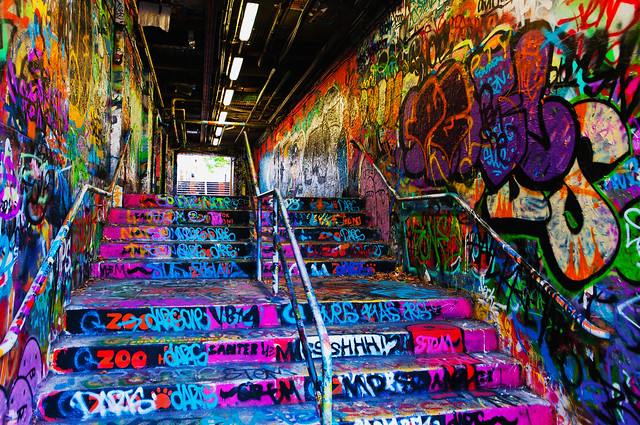Discuss the question “What is art?”
The discussion we were having today while walking through the city was a very interesting one indeed- What is art? If we were to take the literal definition of art being “the expression or application of human creative skill and imagination” then would not EVERYTHING be art? As sensate beings, humans experience everything through their senses, so any interaction we have by definition involves the expression and application of our “creative” (to “bring into existence”) skill. After all, anything we do involves us bringing into existence (i.e. creating) our own beliefs, ideas and values.
Of course, to take this literal (and rather generic) description of art would diminish the real beauty of what art is. Perhaps, instead, we can look at the intentions of the creator. If a five year old paints a car at kindergarten, they are involved in the process of creating an ‘artwork’, but I’m sure most would agree that it is not “art”. In a similar vein, if a person simply puts a dot in the centre of a page and declare it their masterpiece, are we obliged to call it art? (After all, it was their intention to create art).
In fact, we saw something similar on our visit to Whiteley’s studio where we viewed “Alchemy”- Blake’s grain of sand. This in itself raises a fair few questions:
- if the “grain of sand” wasn’t part of a larger piece of work, would we still consider it art?
- If we weren’t told explicitly that it was “Blake’s grain of sand,” would we still consider it art?
I think, with the knowledge we have now, the answer is undoubtedly yes, but what if we consider “Alchemy” never existing and Whitely only creating a dot on a canvas. He knew that it was Blake’s grain, but if he never told us we would not, so does it lose its artistic qualities?
This is why to answer the question “what is art” is so difficult. Personally, I believe it is the intention of the creator, first and foremost, that decides what is art. Of course, the effect of art on an individual or group has merit, but one must consider if the same effect would be achieved if one did not consider the piece “art”. I think a great example of this is graffiti- The Graffiti Tunnel at the University of Sydney is considered by most to be a wonderful piece of art, yet when someone graffitis in a place they’re not supposed to, it is frowned upon and quickly removed. What is so intrinsically different about the two that decides one is art and one isn’t, besides the fact we are ‘told’ one of them is beautiful?


